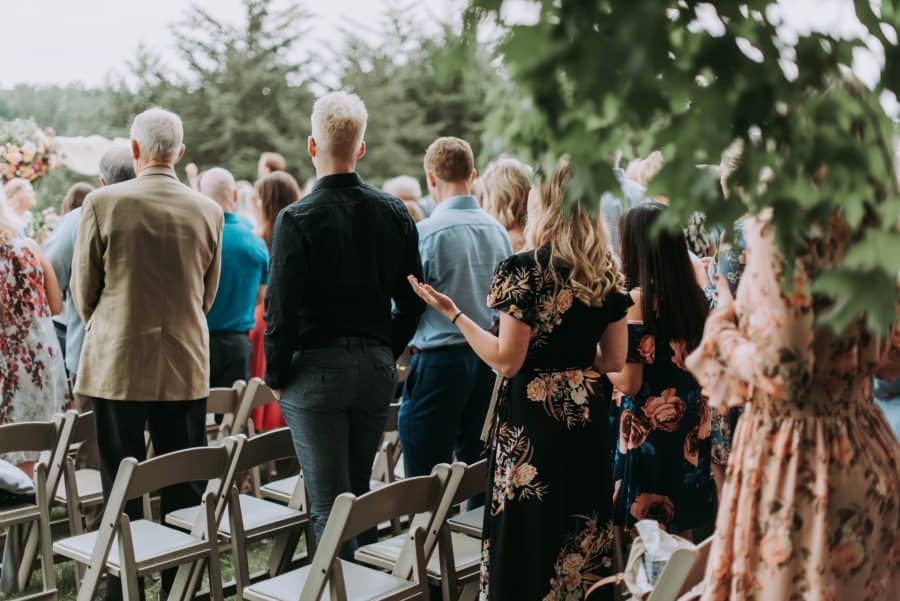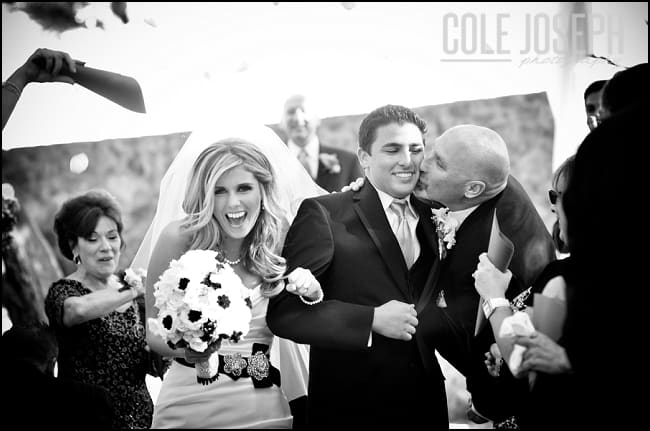Stay Calm. Be Confident. And Learn How to Deal with Difficult Guests as a Photographer
If you photograph weddings or even private portrait sessions, you’ll eventually wind up encountering one…a client or guest who wants to be the official photographer, boss you around or tell you how to do your job. It’s frustrating. It’s maddening. And it’s stressful. But it is inevitable. So what should you do when the situation comes up? We have a few tips on how to deal with difficult guests as a photographer.
Most of these tips focus on photographing a wedding. But the techniques apply to just about any kind of session where you are dealing with lots of people and are working on a time frame. These are techniques I learned back in my PR and communication days of facilitation, managing groups and dealing with the public. Use them for whatever kind of photography you specialize in!
Identify the type of guest causing disruptions
I dislike caricatures or stereotypes. I think they are unfair and speaking in them can make us professional photographers look snobbish and elitist. But at some point in time during our photography careers, we will have to learn how to deal with difficult guests as a photographer.
Usually, the difficult guest falls into one of three categories…the person who wishes they were the hired photographer, the person who just wants to control everything, or the group comedian. (For a list of other types of difficult customers and some basic tips, click here.)
The person who wishes they were the hired photographer
The person who wishes they were the hired photographer might be a fellow professional photographer, an amateur photographer or just a guest who really loves photography. She brings her camera with her to your wedding or session and takes her own shots. She either follows you around shooting over your shoulder, or sometimes gets in your way when you are trying to get the shot. Not only are you tripping over her every time you turn around, she’s distracting the guests giving them the wrong instructions.
The person who just wants to control everything
The person who just wants to control everything might not know a single thing about photography in reality. He just wants to be in control of the situation for whatever reason. He might be a dad that doesn’t want to be there or an overbearing uncle who’s used to bossing anyone and everyone around. So he tells you where to go, how to shoot, to hurry up, and is just generally grumpy and brusque, bordering on rude. He has everyone on edge and no one is enjoying themselves, especially you. You feel harassed, rushed, or even micromanaged.
The group comedian
The group comedian is the guest who is always cracking jokes, telling stories or goofing off. There’s nothing wrong with having a group clown. Sometimes those jokes and antics are generally funny and the humor is well received and appreciated. Other times, the group comedian is passive-aggressive and mean-spirited. Or if his behavior disrupts or distracts your group, you will be forced to deal with it.

How to deal with difficult guests as a photographer
When I encounter these types of guests at my weddings or sessions, I always think of a scene from “The Wedding Singer.” The father of the bride is less than thrilled with the poor toast of Robbie the wedding singer and makes a rude remark.
Robbie replies by screaming “Well I have a microphone and you don’t so you will listen to every damn word I have to say!”
That’s what I really want to do. Throw my shot list on the floor and yell “I’m the professional photographer, people, so you will listen to every word I have to say.”
But that won’t serve anyone. Not me. Not the difficult guest. And certainly not my client. And I’m in this business to serve clients.
So what can you do when you have a second shooter that you didn’t ask for or a session coordinator you didn’t hire?
Here are a few steps to take that can help. My goal is always to rectify the situation with the least amount of hoopla possible. That means trying the most benign approach first before going full-on beast-mode screaming about your contract and reminding the world that you’re the paid photographer.
Step 1. Educate and talk with your clients.
When you meet with your bride and groom, discuss the issue with them. Talk about having a camera-free (some call it unplugged) wedding (including cell phones) and the pros and cons of that. I also ask “Is there a family member who really loves photography that hinted around about being your wedding photographer?”
Many times the couple will glance at each other, laugh nervously, then spill the beans. “Ugh, yes,” they’ll tell me.
I also ask if the anticipate any problems with the wedding party or immediate family. Do they have a super bossy aunt or grouchy uncle who likes to be in charge and tell everyone what to do?
Then together we identify who that person is, what relationship they have with the couple and how to best handle that person.
Even if they don’t identify anyone by name, it’s an opportunity to discuss how to deal with difficult guests as a photographer at their wedding. Some brides want me to go JJ Watt and take out the offending guest at the knees. Other couples say their guests enjoying themselves is more important than perfect pictures and if someone with a cell phone is in the aisle during the first kiss, well, that’s real life. This gives me clear understanding of my clients expectations about making peace with guests vs. getting the shot.

Step 2. Remember who you serve.
At the end of the day, we were hired to serve our clients. Not our own egos. And sometimes, that’s why these difficult guests are so difficult…they threaten our egos. If we are brutally honest with ourselves, that’s one part of what makes these people so infuriating. Even if they have the very best of intentions (and many do!) the story our ego makes up is something much more sinister.
Here’s a sample story I’ve told myself in the face of one of these types of guests.
“Oh she thinks she’s a better photographer than I am. She’s mad because I got the job and now she’s going to use my poses and setups and post to social media before I can and act like she’s the photographer for this wedding. Backstabbing wannabe…”
But that’s just my ego talking. My ego is threatened so I respond with ire and a really ungracious attitude.
Same thing for the grumpy uncle who thinks the photoshoot is stupid and a waste of time. The story I start to tell myself usually goes something like this…
“Okay dude, I get it. You think what I do is so simple and paying for a photographer is a waste of money. How about I come to your tire store and stand over your shoulder and talk about how easy it is to turn a wrench. Jerk…”
If instead, I approach the situation from a place of service, I remember that these guests are around because they are important to my client. It doesn’t help me deal with that person, but it does help me keep my attitude and frustration in check. And it helps rewrite that story I was telling earlier. The guest isn’t there to just ruin my day and make my life difficult. She or he is there because she has a connection and is important to my client.
Step 3. Practice active listening and build rapport.
Take a few minutes to introduce yourself to the difficult guest. Listen to them to see what their problem is (if there even is one). Let them have their say. Even if they are wrong.
Once you understand where that person is coming from and why they are acting the way they are, you can begin to get a better idea of how to move forward.
Take a minute or two to build some rapport. If it’s a guest with a camera, ask what they are shooting. Photographers LOVE to talk about their gear. Ask what her favorite things are to take pictures, how longs she’s been a photographer, etc.
If your difficult guest isn’t a photographer but still wants to control everything, you still need to visit with him. See if you can get his story. Why he’s there, how he knows the bride and groom. Echo back his statements to him if he identifies a problem.
The group comedian is usually motivated by attention. They like the chuckle or groans or playful reprimand they get from their peers. Giving acknowledgment upfront can often head off the attention-seeking behavior at the pass.
As you can tell, one of the big keys here is to acknowledge these people. I’ve found most of the time, that’s all difficult guests are looking for. Some acknowledgment and maybe a little bit of praise for helping out. Because they really do feel like they are helping or have something to contribute.
What wedding photography gear do you need? Check out our tutorial!

Step 4. Give the difficult guest a job.
Now that you know who the guest is and maybe even their skills, it’s time to put those skills to use in a positive manner. So give the guest a job! It doesn’t really matter WHAT you give them to do. The important thing is you engage them in a job that helps get them out of your way so you can do your thing.
Ask them to:
- Hold your reflector or lightstand
- Fix the bride’s dress between shots
- Keep track of your shot list so you don’t miss any shots
- Line up family behind the scenes so they are ready for the next set of portraits
- Track down props
- Take some behind the scenes photos of you for your social media
- Round up the nonessential guests milling about and escort them to someplace else
- Keep your shooting area clear and keep other guests from stepping in to visit with the couple
- Take some candid images of guests or decorations or the outside of the venue.
- Go check on or chat up another family member
Here’s what those conversations look like for me…
“Oh great, Derrek. Say, I’m running a little behind here. I know what I could really use right now is someone who’s prepping the guys before they come up for wedding party formals. Could you round up your fellow groomsmen and make sure their ties are on, jackets are on and buttoned and flowers are on correctly please? That would really speed things up and make sure we don’t get further behind.”
Or
“Katie, could you help me out? I could really use another set of eyes on these shots. As I’m lining everyone up, can you check to make sure that no one has a hair tie on their wrist, everyone is wearing the right shoes and hair and dresses look good? That would be a huge help to me. “
Step 4. Address the problem with the whole group
My next step is to address the issue, in a generic way, with the entire group you are working with.
This can be helpful if the problem is happening during family or wedding party formals or another small group setting. Don’t call out the difficult guest individually, but rather, address the problem generally.
“Alright guys, can I have your attention? I know formal pictures aren’t your favorite thing. You’d much rather go back to the prep room and finish your game of cards and celebrate with some shots. If you will give me your cooperation and attention for the next few minutes, we can get these done quickly and efficiently. Then we’ll all go back and celebrate with a shot. So, that means, phones and beers on the table over here. Even if you aren’t in this picture, please put your phones away. I want everyone focused on just me. It helps things go so much more quickly. I’ll leave a few minutes at the end for you to take some candid pictures with each other.”
Or something like…
“Okay everyone, I know you all want to take pictures with each other. I want to leave you enough time to do just that, okay? But Chrissy and David have a list of the images they want, so we are going to prioritize those pictures first. Then, when I’m done with those, there will be time for you to take different pictures with each other. So if you could help by letting me stick to this list, we can wrap these up and I’ll let you all mingle and take the photos you want to do!”
Be assertive but not aggressive. I try to keep things light at this point. I like this approach for a few different reasons. First, this puts everyone on notice as to your intention. Second, you enlist the help of the larger group at figuring out how to deal with difficult guests as a photographer. They usually start policing each other and your work is done.

Step 5. Quiet discussions
Most of the time, assigning tasks is enough to adequately deal with difficult guests. You’ve acknowledged and empowered them to help in some way, so they feel part of the process. And if you can give them a job that keeps them out of your way, your problem might be solved.
But not always. The next step should be to have a quiet discussion with the guest. Again, acknowledge their experience and contribution but ask for their cooperation. Do this quietly, away from the other guests. Explain that having their cooperation is critical to your success and ultimately, the happiness of your client. As Dale Carnegie says, appeal to nobler motives.
“Kristin, I value your expertise as a photographer. But as I’m working around the dance floor, I’m noticing you are in all my shots. That means I’m probably in all of yours, and that’s not what either of us want, and it’s certainly not what your sister wants in her final wedding album. So let’s work together here, shall we?”
Or maybe this, to the father-of-the-groom who’s telling the wrong family members to get in the picture.
“Dan, can I talk to you for a second? I know as the father of the groom, this is a really important day for you. You are crazy proud of your son and so excited to share this day with him and all your family. I know you want pictures of ALL of your family that are here today. I think that’s awesome. The problem is, Chrissy and David and I worked together on a timeline and a shot list. That’s the list we planned for and that I’m working through. I promise there will be time after the ceremony during the reception for family to gather together and take some awesome pictures. But right now, we need to work through the list David and Chrissy requested so we can keep their special day running on track.”
Focus on the outcome that will be achieved when you work together and maintain a sense of purpose. Don’t ask their opinion because that’s opening a path for an argument. Describe what you need very specifically without blame and aggression.
Step 7. Sometimes, do nothing
Occasionally when you are trying to deal with difficult guests as a photographer, your best course of action is none at all.
Meaning, don’t make a problem if there isn’t really a problem. If the guest’s behavior is annoying but not inteferring with your work, timeline or affecting other guests, take a page from Elsa’s play book and let it go.
If I’m dealing with a group comedian, I’ll often let his humor run its course if it’s benign and not disruptive. Most of the time I even laugh myself.
If it’s the grumpy best man, I let him be grumpy, get my shots and move on.
If the groom’s brother in-law wants to be my unofficial second shooter, he can click away as long as it doesn’t become a real impediment to me doing my job.
Are these guests still frustrating and annoying? Oh yes. Absolutely. But if they aren’t really a problem, roll your eyes and move on. You have more important things to do than pick a fight where none exists.

Step 8. Call in reinforcements
In my initial consult with my client, I always ask for a family member, wedding party member or another guest who can help me ride herd on the day. Someone can help be the enforcer. If I’m still not getting cooperation from a difficult guest, I enlist my enforcer. I make my problem the enforcer’s problem and let them take care of the situation. If that fails, I have a quiet conversation with my client about what’s going on and how it’s preventing me from doing my job. I explain I want to give them the best wedding experience possible, but I’ve run out of options on dealing with this guest. Then I enlist their help in finding a good way to deal with it.
In three years of shooting weddings and dozens of large group and volume jobs, I’ve only ever had to take this step once when I had to deal with difficult guests as a photographer. The first few steps are almost always effective.
More resources on dealing with difficult guests or clients
Below are some of my favorite resources on how to deal with difficult guests or clients. Some are about customer service, specifically. Others are about better understanding people in order to better understand how to respectfully interact with them.
- How to Win Friends and Influence People by Dale Carnegie
- The Thank You Economy by Gary Vanyerchuk
- The Road Back to You: An Enneagram Journey to Self Discovery
- Perfect Phrases for Dealing with Difficult People: Hundreds of Ready-to-Use Phases for Handling Conflict by Susan Benjamin
- Dare to Lead by Brene Brown
And for the love of Pete, don’t be that difficult guest!
As you are out and about at different community events or weddings, remember not to be that difficult guest. I know its super tempting to take your camera and sneak in some practice or special shots of your own. But you’re running the risk of being the difficult guest.
My best advice? Leave your camera at home. Enjoy the day as a guest and focus on interacting with family and friends as a person, not a photographer.
If you feel like you need to take your camera, stay well away from the paid photographer. Give him room to do his thing and fulfill his obligations to his client. Treat him with the professional courtesy you’d like in his shoes.
Difficult guests are everywhere.
If you’re in business long enough, you will have a difficult guest. I encounter them at weddings and even when I’m working a volume shoot with 5th-grade baseball players. There’s a mom that wants me to know she’s a photographer, too, or the father of the groom that needs to be in charge. It still frustrates me, but by approaching the problem with an attitude of service instead of a sense of righteous indignation helps give me the right frame of mind to find the best strategy to solve the problem. Remember to keep your cool, be the professional and focus on serving your clients. It’s not easy. It requires confidence, calm and a clear head. But resolving the situation before anyone gets strangled with a microphone cord should always be your goal.







